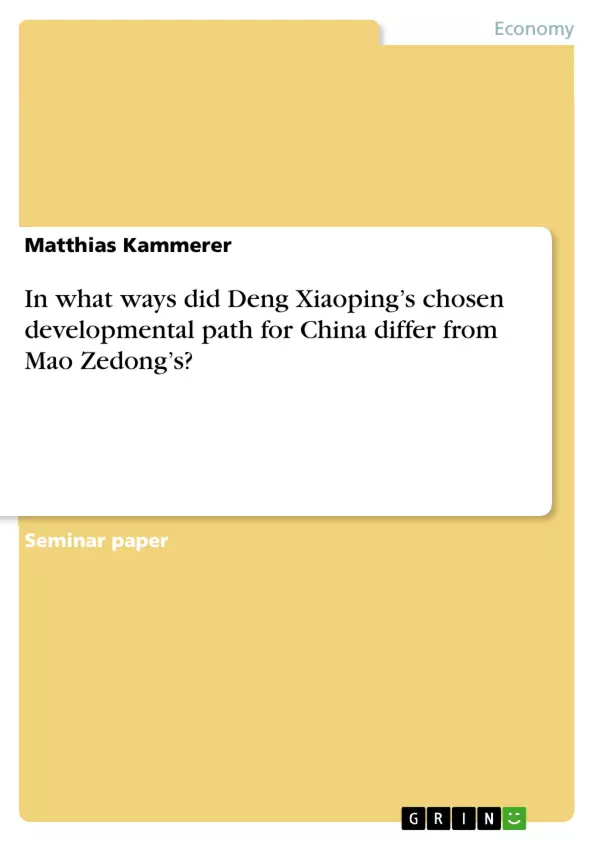Since the second half of the 20th century the Peoples Republic of China (PRC) has been trough numerous incidents and changes with regard to policy as well as economy. This period was mainly affected by two paramount leaders: Mao Zedong (1949-1976) and Deng Xiaoping (1978-1997). In my essay I want to show the developmental paths and the outcomes concerning the political, social and economic achievements.
As it will emerge throughout the assignment, they followed basically different ways to create their new China.
Inhaltsverzeichnis (Table of Contents)
- Introduction
- Mao Zedong's Development Path (1949-1976)
- The Land Reform Law and Collectivization
- The Great Leap Forward (1958-60)
- The Hundred Flowers Campaign (1956)
- The Cultural Revolution (1966-1976)
- Deng Xiaoping's Development Path (1978-1997)
- From "Seeking Truth from Facts" to "Getting Rich is Glorious"
- Economic Reforms: Agriculture, Industry, and Special Economic Zones
- Conclusion
Zielsetzung und Themenschwerpunkte (Objectives and Key Themes)
This essay analyzes and compares the developmental paths of Mao Zedong and Deng Xiaoping in the People's Republic of China (PRC) from the second half of the 20th century. The essay aims to showcase the political, social, and economic achievements of each leader, examining the outcomes of their distinct strategies.
- The contrasting ideological and practical approaches of Mao Zedong and Deng Xiaoping to economic development.
- The role of socialist ideology, class struggle, and collectivization in Mao Zedong's policies.
- The transition from a closed-door, self-sufficient economy under Mao to a more open and market-oriented approach under Deng.
- The impact of economic reforms on China's growth and prosperity.
- The relationship between economic development and political reforms in the PRC.
Zusammenfassung der Kapitel (Chapter Summaries)
The essay begins by examining Mao Zedong's leadership from 1949 to 1976. Mao's policies, driven by socialist ideology and a commitment to class struggle, focused on land reform, collectivization, and the Great Leap Forward. These campaigns, however, led to disastrous consequences, including widespread famine and political repression. The essay then analyzes the Cultural Revolution, a period of social upheaval and violence that further hampered China's development.
The second half of the essay delves into Deng Xiaoping's leadership, highlighting his pragmatic approach to economic reform and opening up to the outside world. Deng's policies, characterized by a focus on "seeking truth from facts" and "getting rich is glorious," resulted in significant economic growth and a rise in living standards. The essay explores the key aspects of Deng's economic reforms, including agrarian reforms, industrial reforms, and the establishment of Special Economic Zones.
Schlüsselwörter (Keywords)
The essay focuses on key concepts such as socialist ideology, class struggle, collectivization, economic development, political reforms, Mao Zedong, Deng Xiaoping, the Great Leap Forward, the Cultural Revolution, Special Economic Zones, and the Chinese Communist Party (CCP).
Frequently Asked Questions
How did Mao Zedong's economic path differ from Deng Xiaoping's?
Mao focused on socialist ideology, class struggle, and collectivization (e.g., Great Leap Forward), while Deng introduced pragmatic market-oriented reforms and opened China to the outside world.
What was the "Great Leap Forward"?
It was a campaign by Mao (1958-60) aimed at rapidly transforming China from an agrarian economy into a socialist society through industrialization and collective farming, which ultimately led to a major famine.
What does Deng Xiaoping's phrase "Seeking truth from facts" mean?
It represents Deng's pragmatism, moving away from rigid Maoist dogma to focus on policies that actually produced economic results and improved living standards.
What role did Special Economic Zones (SEZs) play in China's development?
Established under Deng, SEZs allowed for foreign investment and market experiments, serving as catalysts for China's rapid export-led economic growth.
What were the social consequences of the Cultural Revolution?
The Cultural Revolution (1966-76) caused massive social upheaval, violence, and economic stagnation, which Deng later sought to repair through modernization.
Did political reforms follow Deng's economic reforms?
The essay explores the relationship between economic growth and political control, noting that while the economy liberalized, the Communist Party maintained its political authority.
- Citar trabajo
- Matthias Kammerer (Autor), 2005, In what ways did Deng Xiaoping’s chosen developmental path for China differ from Mao Zedong’s?, Múnich, GRIN Verlag, https://www.grin.com/document/83238



